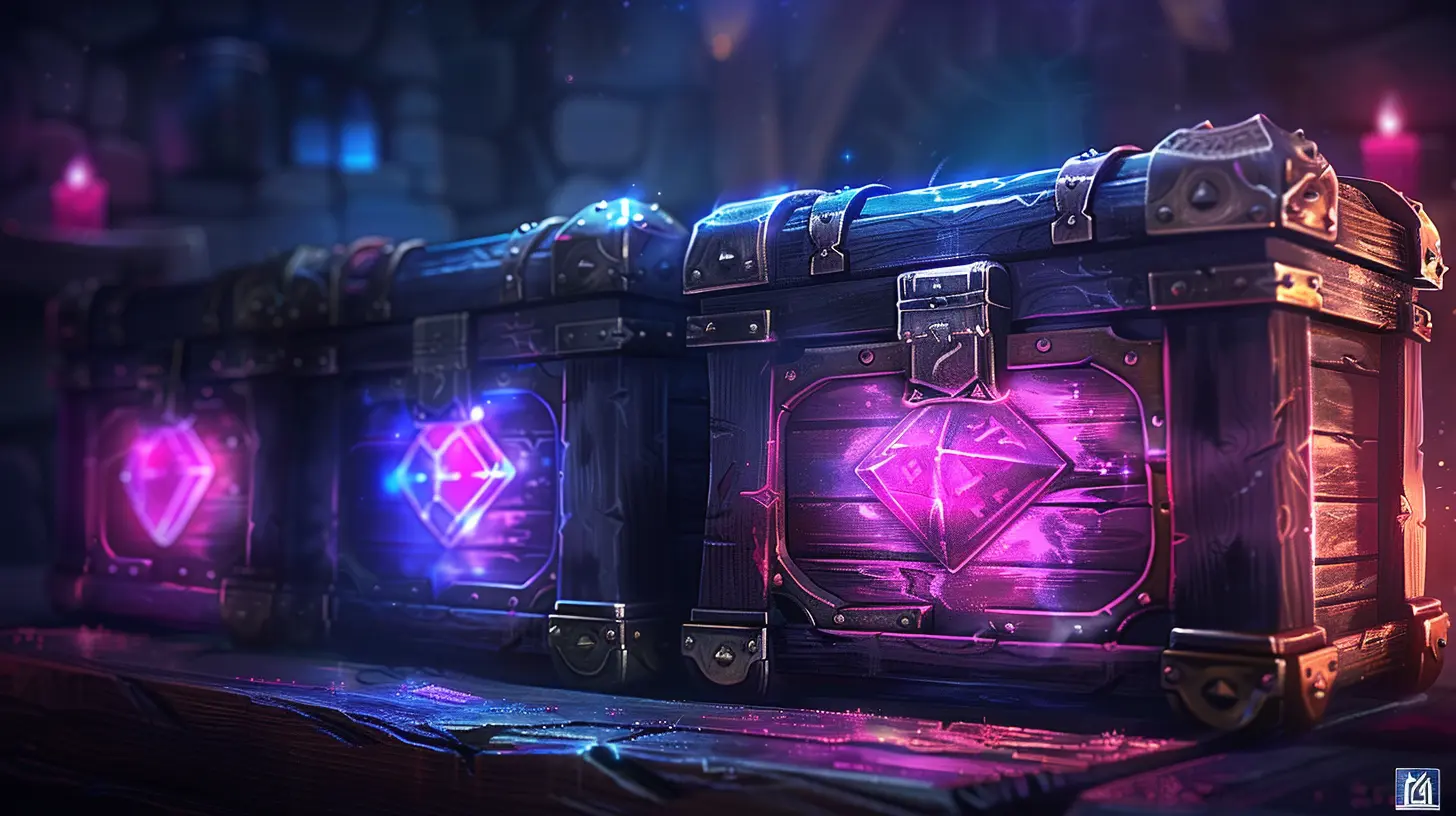Loot Boxes: A Gateway to Gambling for Younger Gamers?
24 December 2024
Alright, let’s get real here—loot boxes are everywhere. If you’ve spent even five minutes playing a video game in the past decade, chances are you’ve encountered one. You know the drill: click a shiny button, hear a satisfying ka-ching, and voilà—a virtual treasure chest spills out goodies that range from incredible to downright disappointing.
But while we’re all caught up in the thrill of unlocking the next big thing, there’s a bigger question lurking in the shadows: Are these loot boxes actually a sneaky introduction to gambling? And more importantly, are younger gamers—many of whom are still figuring out how to manage their pocket money—being led down a dangerous path? Let’s dive in.
What Are Loot Boxes, Anyway?
For the uninitiated, loot boxes are basically digital grab bags. They’re like those surprise toy vending machines you see at grocery stores, except virtual. You pay either with in-game currency or real-world money, and in return, you get a randomized reward. It could be that ultra-rare weapon skin you’ve been drooling over—or, more likely, yet another useless in-game sticker. It’s all about chance.While loot boxes might seem harmless at first glance—just a quick dopamine hit—they bring with them a murkier side. And honestly, the line between “fun game mechanic” and “gambling lite” is blurrier than a cheap webcam.
The Allure of the Unknown: Why Loot Boxes Are So Addictive
Let’s face it—humans love mystery. It’s why we binge-watch crime dramas, read spoiler-free reviews, and, yes, open loot boxes. There’s something irresistible about not knowing what’s inside. It could be the jackpot! Or… it could be junk. Either way, it’s the thrill of the unknown that keeps us hooked.Psychologists will tell you this taps into something called a "variable reward system." In simpler terms, it’s like a slot machine: you keep pulling the lever because the next pull might be The One. And just like that, loot boxes mimic real-world gambling mechanics.
For younger gamers, this pull is even stronger. After all, kids and teens have brains that are still developing, meaning they’re particularly vulnerable to chasing that rush and ignoring the consequences. The sparkle of a loot box? It’s like dangling candy in front of a kid—hard to resist and oh-so-tempting.
Loot Boxes vs. Gambling: Are They Really the Same?
Here’s the million-dollar question: Do loot boxes count as gambling? Technically, it depends on where you live. Some countries, like Belgium and the Netherlands, have regulated or outright banned loot boxes under gambling laws. Others… well, they’re still debating.The main argument against loot boxes being considered gambling is that you always get something in return for your money, even if it’s just a worthless virtual trinket. With traditional gambling, there’s a chance you walk away empty-handed. But let’s not kid ourselves: the randomness, emotional highs and lows, and deliberate design are eerily similar.
Think about it this way—if it looks like a duck and quacks like a duck, chances are it’s a duck, right? Loot boxes may not involve poker chips or roulette wheels, but they sure feel like gambling in disguise.
How Younger Gamers Are Being Targeted
So, how do these loot boxes reel in younger audiences? It’s not just luck—it’s strategy. Video game developers know how to work their magic when it comes to making these little treasure chests irresistible.1. Bright and Flashy Graphics
Loot boxes are often dressed up like the coolest gift-wrapped packages you’ve ever seen. Lights, animations, sparkles—it’s like Christmas morning every single time. And who doesn’t love a little eye-candy?
2. Exclusive Rewards
FOMO (fear of missing out) is real. Many loot boxes dangle limited-edition items that you can only get by opening them. Miss out, and you might never see that sweet dragon-themed armor again.
3. Low Initial Costs
Here’s the kicker: many games let you open your first loot box for free or at a super low price. It’s the gateway drug of gaming. Once you’re in, spending $1 more feels like no big deal. But $1 becomes $5, and $5 becomes $20, and before you know it, you’re Googling “how to refund in-app purchases.”
4. Peer Pressure
Gaming is often a social experience, and seeing your friends flaunt their rare loot is a surefire way to feel left out. This competitive edge pressures younger gamers into spending money to keep up.
5. In-Game Currency Masks Real Spending
By converting real money into virtual gems or coins, loot boxes cleverly distance players from the reality of their spending. It’s sneaky, almost like paying with Monopoly money.
Are Parents Paying Attention?
Here’s where things get a little sticky. Kids aren’t always the ones paying for these digital doodads—parents often foot the bill, knowingly or not. One minute you’re handing your kid the iPad to keep them entertained, and the next thing you know, your credit card statement shows a $200 charge for “gem packs.”The truth is, not every parent realizes just how predatory some of these designs can be. And even if they do catch on, explaining the psychology of loot boxes to a determined 12-year-old is like trying to convince a cat to take a bath—it’s not easy, folks.
The Consequences of Early Exposure to Gambling-Like Mechanics
So, what’s the big deal? It’s just a game, right? Not exactly. Studies suggest that early exposure to gambling-like mechanics can increase the likelihood of gambling problems later in life. And it makes sense if you think about it—if kids grow up normalizing the idea of “pay money for a chance to win,” they’re more likely to carry that behavior into adulthood.But it’s not just about the future. Loot boxes can also create more immediate problems:
- Financial Stress: Blowing through their allowance (or worse, your credit card).
- Gaming Addiction: Spending more time chasing loot than actually enjoying the game.
- Frustration and Anxiety: The heartbreak of chasing rare rewards without success can take an emotional toll.
Should Loot Boxes Be Regulated?
At this point, the debate over loot box regulation is heating up worldwide. Some argue that it’s up to parents to monitor their kids’ gaming habits. Others believe the responsibility lies with game developers to be more transparent—or to eliminate loot boxes altogether.And then you have governments stepping in, like when Belgium banned loot boxes entirely. While that might sound extreme, it’s rooted in the idea of protecting younger, more impressionable audiences from potentially harmful behaviors.
The thing is, loot boxes aren’t inherently evil. When handled responsibly, they can add a layer of excitement to games. The key lies in finding a balance—one that doesn’t exploit younger players or encourage risky spending habits.
What Can You Do About It?
If you’re a parent, gamer, or just someone invested in this topic, there are ways to take action:- Stay Informed: Know which games use loot boxes and how they work.
- Set Boundaries: Use parental controls to limit in-game purchases.
- Talk to Kids: Teach them about the risks of gambling-like behavior.
- Support Transparency: Advocate for clearer odds and better regulation within the gaming industry.
And if you’re a gamer who’s fallen into the loot box rabbit hole—hey, no judgment! Just be mindful of your habits, take frequent breaks, and remember to enjoy the game itself without getting too caught up in the chase.
Final Thoughts
Loot boxes are an undeniably controversial topic in the gaming world. Are they a harmless form of entertainment, or are they grooming younger players for a lifetime of risky gambling habits? The answer might lie somewhere in between, but one thing’s for sure—it’s a conversation worth having.As the gaming industry continues to evolve, we've got to keep asking the tough questions. Because at the end of the day, games should be about fun and creativity, not exploitation. And whether you’re a parent, a player, or just someone who loves a good debate, it’s up to all of us to keep pressing for change.
all images in this post were generated using AI tools
Category:
Loot BoxesAuthor:

Pascal Jennings
Discussion
rate this article
16 comments
Isadora McHugh
Great points! It’s crucial we discuss how loot boxes impact young players today.
February 3, 2025 at 5:40 AM

Pascal Jennings
Thank you! Addressing the impact of loot boxes on young players is essential for understanding their potential risks.
Jolene Klein
Let's promote responsible gaming and awareness to ensure a safe environment for younger players!
January 29, 2025 at 3:52 PM

Pascal Jennings
Absolutely! Promoting responsible gaming is crucial to protect younger players and foster a safe gaming environment. Thank you for highlighting this important issue!
Ella Hill
Are loot boxes the new candy cigarettes? They might look harmless, but they're sweetening the deal for younger gamers—turning playtime into prime time for risky habits. Proceed with caution!
January 27, 2025 at 4:41 AM

Pascal Jennings
That's a compelling analogy. Like candy cigarettes, loot boxes can normalize risk-taking behaviors in young gamers, potentially leading to gambling habits. Awareness and regulation are essential to protect vulnerable players.
Chelsea McFee
Empower awareness, foster healthy gaming habits for all!
January 25, 2025 at 3:39 PM

Pascal Jennings
Thank you for your support! Promoting awareness and healthy gaming habits is crucial in protecting young gamers from potential risks associated with loot boxes.
Zander Cain
Balance fun and responsibility for young gamers.
January 21, 2025 at 4:37 PM

Pascal Jennings
Finding a healthy balance between fun and responsibility is crucial. Encouraging awareness and setting limits can help young gamers enjoy their experiences while avoiding potential pitfalls like loot boxes.
Max McAndrews
Are loot boxes the new playground for addiction?
January 20, 2025 at 3:46 AM

Pascal Jennings
Yes, loot boxes can mimic gambling mechanics, making them particularly appealing and potentially addictive for younger gamers.
Corinne McGrath
In shadowed realms where pixels gleam, Loot boxes whisper, dreams to redeem. Yet caution calls, for youth may find, A gamble's thrill can bind the mind.
January 13, 2025 at 3:15 PM

Pascal Jennings
Thank you for your poetic insight! You’ve captured the allure and risks of loot boxes beautifully. It’s crucial to raise awareness about their potential impact on young gamers.
Desiree Simon
Loot boxes blur the line between gaming and gambling, raising concerns for younger players.
January 10, 2025 at 5:27 PM

Pascal Jennings
Loot boxes do present a risk of normalizing gambling behaviors among younger players, making it essential for parents and regulators to address these concerns.
Noelle McLaury
This article highlights a crucial issue. Protecting younger gamers from potential gambling influences in loot boxes is essential for their well-being and future enjoyment.
January 8, 2025 at 5:13 AM

Pascal Jennings
Thank you for your insight! Protecting younger gamers is indeed vital in ensuring a safe and enjoyable gaming experience.
Orionyx West
This article raises fascinating questions about the intersection of gaming and gambling. How do loot boxes influence young players' perceptions of chance and reward? Are we witnessing a new era of gaming ethics that demands urgent attention from developers and regulators?
January 6, 2025 at 5:45 PM

Pascal Jennings
Thank you for your insightful comment! Loot boxes certainly blur the lines between gaming and gambling, impacting how young players perceive reward systems. This emerging dynamic highlights the need for developers and regulators to address ethical considerations in game design.
John Brown
This article raises valid concerns about loot boxes potentially leading younger gamers into gambling habits. It's crucial for the gaming industry to consider the psychological impact on impressionable players and implement stricter regulations to protect them from harmful practices masked as entertainment.
January 2, 2025 at 4:13 PM

Pascal Jennings
Thank you for your insightful comment! I completely agree that addressing the psychological impact of loot boxes on younger players is essential, and I hope this article sparks further discussions on implementing necessary regulations in the gaming industry.
Wilder Cannon
This article raises important concerns about loot boxes and their potential impact on younger gamers. As developers continue to push these features, we must prioritize transparency and education to ensure that our gaming culture promotes responsible spending and healthy habits for the next generation.
December 29, 2024 at 5:58 PM

Pascal Jennings
Thank you for your insightful comment! Prioritizing transparency and education is indeed crucial for fostering a responsible gaming culture.
Zedric James
Loot boxes blur the line between gaming and gambling, especially for younger audiences. They promote impulsive spending and create unhealthy habits. Game developers should prioritize transparency and implement strict age restrictions to protect minors from potential financial harm and the risks associated with gambling behavior.
December 29, 2024 at 3:52 AM

Pascal Jennings
Thank you for your insightful comment. I agree that transparency and strict age restrictions are crucial to protect younger audiences from the potential harms of loot boxes and their association with gambling behavior.
Simon Campbell
While loot boxes spark important discussions on gaming and responsibility, they also offer opportunities for players to learn about risk and reward. By fostering open conversations and encouraging mindful gaming, we can guide younger audiences towards healthy habits and empower them to make informed choices. Let's embrace the potential!
December 28, 2024 at 5:58 PM

Pascal Jennings
Thank you for your insightful comment! Balancing discussions on risk and reward with promoting responsible gaming is essential in guiding younger audiences towards healthy habits. Embracing this potential can lead to informed choices in gaming.
Francesca Robinson
Loot boxes can blur the line between gaming and gambling, potentially exposing younger players to harmful behaviors. This issue warrants serious consideration from parents and regulators alike.
December 27, 2024 at 5:22 AM

Pascal Jennings
Thank you for your insightful comment. The potential risks of loot boxes certainly highlight the need for increased awareness and regulation to protect younger players.
James Ward
As loot boxes blur the lines between gaming and gambling, one must ponder: are players chasing treasures or trapped in a hidden web of chance? In this digital realm, the thrill could overshadow the risks that lie beneath.
December 26, 2024 at 4:13 PM

Pascal Jennings
You're right; loot boxes can create a deceptive thrill, making players unaware of the potential risks. This raises important questions about the responsibility of game developers towards younger audiences.
MORE POSTS

How to Train for Better Reaction Times in FPS Games

How Game Physics Impact Realism in War Simulators

The Best Story-Driven Console Games to Get Lost In

Hidden Console Gaming Gems You Shouldn’t Miss

Cooldowns and Energy Meters: Managing Abilities in Real-Time Combat

Fresh VR Experiences You Can’t Miss

The Evolution of Classic Console Franchises

Fresh Stories and Worlds: New Narrative-Driven Games

What It Takes to Compete in Elite Gaming Leagues

Breaking Stereotypes: How to Avoid Clichés in Character Design